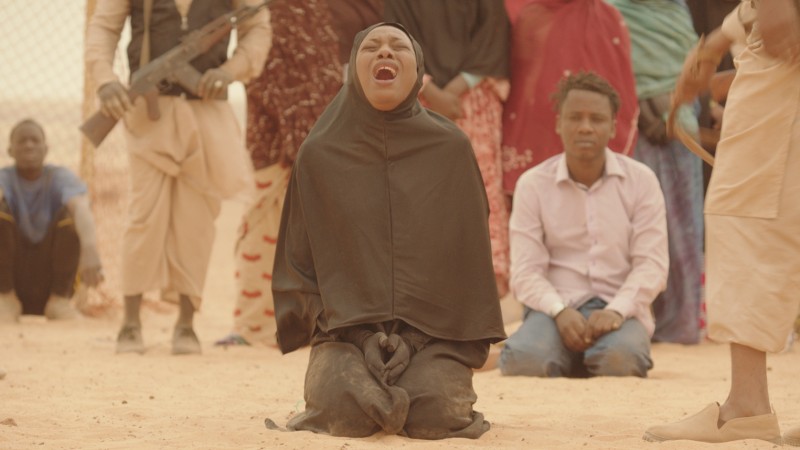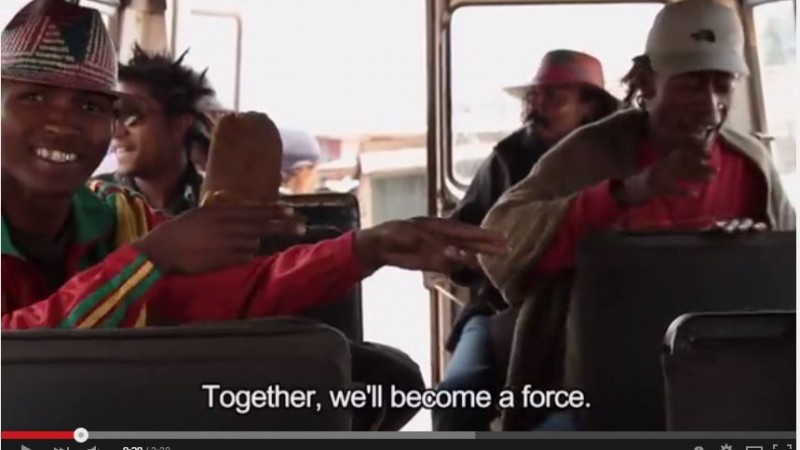
A woman in tears in a screen capture of a scene from the trailer for the film Timbuktu
The Francophone film industry has experienced a nice boost recently thanks to the success of a few recent films, including “Timbuktu” by Mauritanian filmmaker Abderrahmane Sissako and the Malagasy documentary “Ady Gasy“. Other successful projects have showcased the undeniable growth of the sector in the region: “Les Chevaux de Dieu” (God's horses) from Morocco, “La Pirogue” (The Boat) from Senegal, “The River” from Algeria and “Angano Angano” from Madagascar.
While the France-based film industry is having a hard time finding prosperity worldwide, the African continent may turn out to be its saving grace. In fact, that observation could be expanded to the entire French media industry. Still, while the continent is a land of growing opportunities for the sector, the media market still has a few shortcomings that hinder its development.
The promised land for Francophone media
By 2050, an estimated 85% of French speakers will reside in Africa. Africa is home to a very young population with a growing enthusiasm for screens. French media producers quickly understood the potential for success in this market, one where almost everything is still in need of structure from a communication technology standpoint: The continent is still lacking a solid legal structure in information technology (World Bank report PDF) and needs to grow its Internet network (PDF ITU report) in order to provide fast connections to its growing middle class.
French media producers realized the potential as early as the 2000s and have tried to develop the market. Several collaborations emerged between French channels TV5 and CanalSat and West African TV channels. Following the steps of these pioneers, other French TV networks such as the music channel Trace TV decided to install a local agency in the region. That decision proved to be judicious for Trace TV as Africa represents one-third of its turnover today. Trace TV is even looking into expanding its network into mobile phone and radio.

Screen shot of documentary “Ady Gasy” by par Lova Nantenaina via YouTube
Despite these successes, there are still very few French companies that have dared to fully embrace the opportunities the continent has to offer. The window might be closing soon though because media groups from China and North America have seized the opportunity.
An elusive market for French media entrepreneurs
So why the hesitation from French entrepreneurs? While French media seems like a natural linguistic fit for the region, the potential hurdles seem to have given them reason to pause: political instability, corruption and missing infrastructure are some of the reasons that leading groups have mentioned. But the opportunity loss might be too great to ignore now. Jérôme Bodin, a French media analyst, opines:
Si la France souhaite accroître son influence et son rayonnement, elle doit rapidement engager une réforme de ses médias et faire enfin émerger une puissante industrie audiovisuelle.Un pays ne peut pas prétendre exercer une influence sur les affaires du monde sans des groupes audiovisuels forts et exportateurs. La compétitivité des groupes de télévision français s'est effondrée depuis le début des années 2000, tout particulièrement par rapport à leurs pairs allemands et américains.
If France wants to increase its global influence, it must promptly initiate a reform of its media in order to emerge as an impactful media player. A country cannot claim to have an influence on world affairs without a strong media and cultural strategy to boot. The competitiveness of French television network has collapsed since the early 2000s, especially compared to their German and US peers.
Even French politicians have chimed in with solutions. On September 11, 2014, the French National Assembly conducted a session on what policies to apply in order to have better penetration in the African audiovisual market. French member of parliament Bernard Chaussegros suggested that the current business model needs rethinking. He opined that instead of subsidizing organizations and businesses, France should promote cooperation between locals and French groups. This approach might allow for a faster introduction in the region, he argued.
But it seems that the French media have finally awakened from their stupor and have overcome their hangups. For instance, the Lagardère media group has set up a television production office in Dakar, Senegal. In October 2014, Canal+, a French media consortium, launched A+, a channel dedicated to the African continent with the ambition to become “the Top African Channel.” Following this lead, Euronews will propose in 2015 Africanews, a pan-African multilingual information channel.
At a time when European economies are stagnating, Africa seems to be the continent to invest in for broadcasting companies. France also has to overcome a dubious past. Its influence on the African continent has been often scrutinized and filled with controversy. It comes to reason that France's attempt to expand its cultural influence in Africa casts doubts on its agenda. Either way, the competition for media market will be fierce, especially in IT, and it will require a great deal of work to find a place in this new gold rush.






